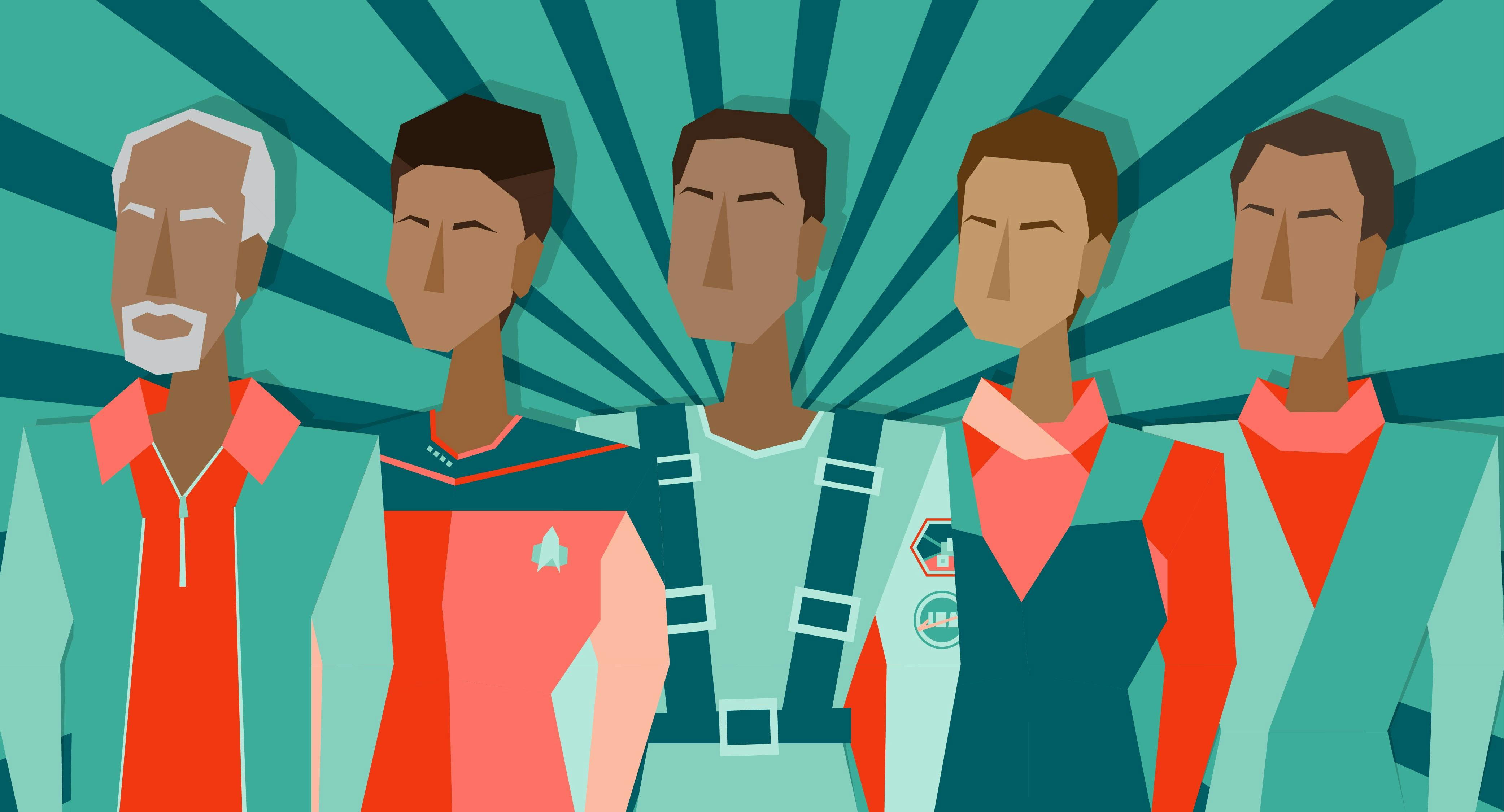Published May 29, 2023
Captains Sisko and Pike Reflect on the Conscience of Conflict
Two of Starfleet's best faced difficult challenges during wartime.
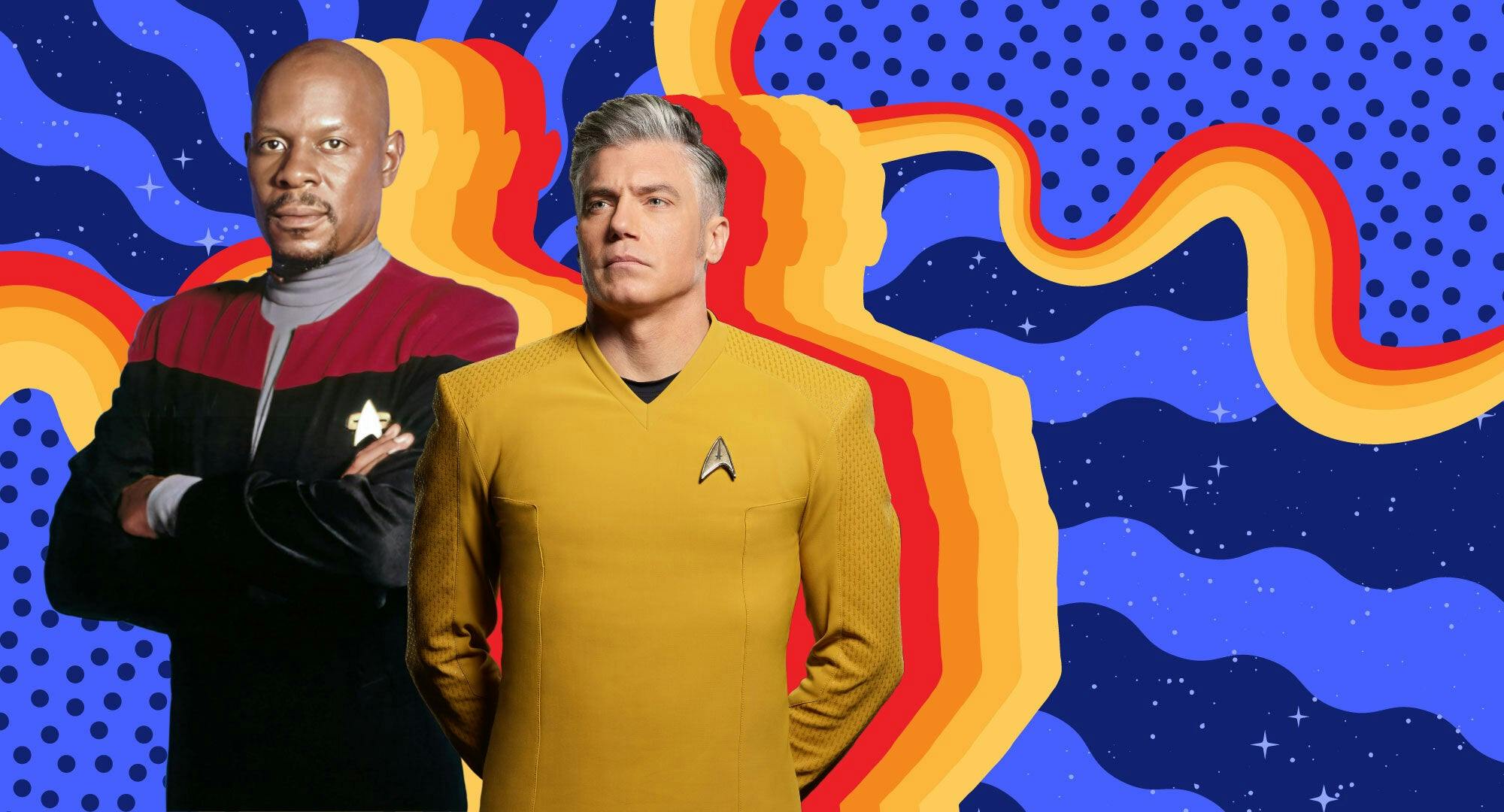
StarTrek.com
As two of Starfleet’s most accomplished officers, Captain Benjamin Sisko and Captain Christopher Pike performed numerous acts of heroism in their service to the Federation. Despite their dedication to diplomacy and exploration, each captain tragically carried an emotional burden related to the horrors of war.
Your First Look at the Newest Short Trek
Mounting casualties in the Dominion War prompted Sisko to undertake a deceptive plot to lure the Romulans into the conflict, an action that was highlighted in the Star Trek: Deep Space Nine episode “In The Pale Moonlight.” On the other hand, Pike remained haunted by his exclusion from the Klingon War and his inability to stand beside his Starfleet comrades, an inner turmoil that crescendoed in Star Trek: Discovery’s “Light and Shadows.”
Let’s dive in and examine the parallel paths that Sisko and Pike trekked during their storied careers.
The Heart of the Issue
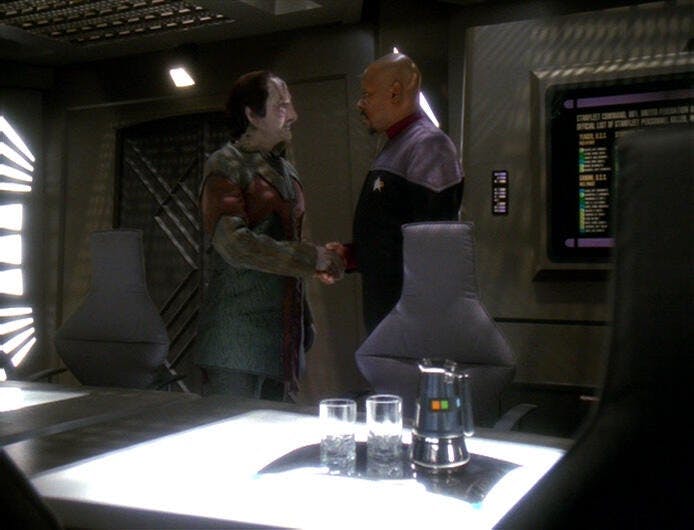
StarTrek.com
Separated by a century of progress, the circumstances surrounding the two captains’ situations bore several similarities. By the time Sisko chose to manipulate the Romulans, the Federation and Klingon Empire had faced off with the Dominion for almost an entire year. Although Deep Space 9’s commanding officer led a successful operation to retake his space station, Starfleet was plagued by endless casualty reports, a manpower shortage, severely damaged shipyards, and an occupied Betazed that placed the Dominion within striking distance of Vulcan, Andor, Tellar, and Alpha Centauri.
In comparison, the Klingon War began with significant Federation losses at the Battle at the Binary Stars and continued on for over 15 grueling months. Under General Kol’s leadership, the Klingons harnessed T’Kuvma’s cloaking technology to wreak havoc on Starfleet. The bloodshed continued long after Kol’s death, as individual Klingon houses delivered crippling strikes that resulted in the destruction of one-third of the fleet, the obliteration of numerous outposts, the capture of Starbase 1, and an assault on Earth that was abandoned at the very last minute. On the brink of defeat, Starfleet ordered the U.S.S. Enterprise to stay out of the fray and act as an instrument of last resort.
The desperate times mirrored one another in many ways, but they influenced the captains in very distinct fashions. A prominent leader on the front lines, Sisko felt that the obligation to turn the tide against the Dominion rested upon his own shoulders. For Pike, his absence from the battlefield during a period that threatened the Federation’s very survival weighed upon his conscience long after hostilities had ceased. Nevertheless, the anguish that shadowed Sisko and Pike manifested from the officers’ dedication to their duty.
Betraying Their Values
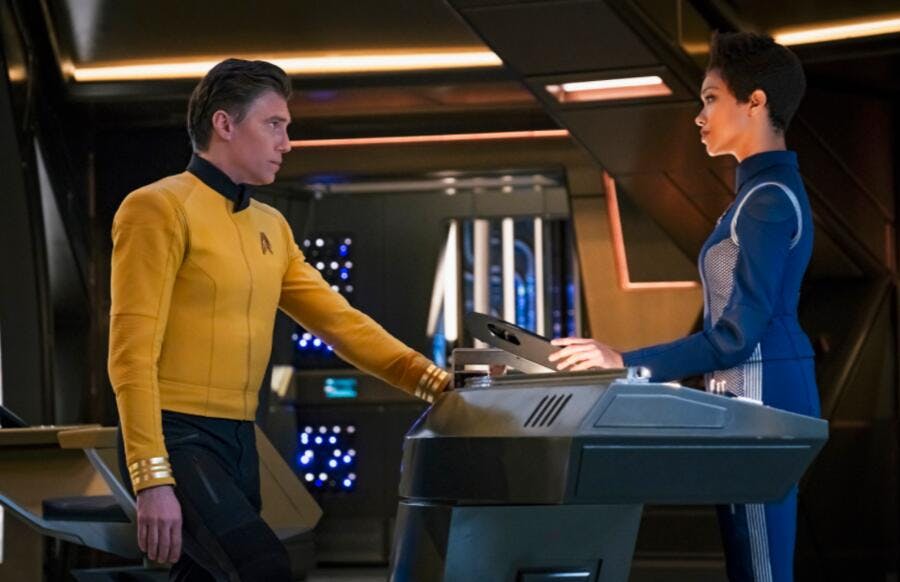
StarTrek.com
Honorable intentions aside, Sisko’s moral compass was tested as he plummeted down a winding abyss of questionable calls. After initially hoping to find genuine evidence that the Dominion planned to attack the Romulans, Sisko reluctantly heeded Garak’s advice and sought to manufacture the proof in order to fool the Federation’s would-be allies. The dangerous trail ate away at the captain’s values piece-by-piece, as Sisko freed a criminal who ended up stabbing Quark, bribed Quark to make the charges go away, provided dangerous biomimetic gel to an unknown individual, and ultimately attempted to trick Senator Vreenak with a forged data rod. Following the ruse’s failure, Sisko learned that Garak’s real plan entailed framing the Dominion for Vreenak’s murder. The revelation enraged the captain, yet he never sought to correct the record or prevent the Romulans from joining the fight.
Pike also thought he had failed his own beliefs, but his betrayal struck at the very core of his being. In Discovery’s “Brother,” the captain emphatically declared that he would not leave behind any potential survivors from the U.S.S. Hiawatha. Similarly, “Saints of Imperfection” saw the captain passionately outline his views regarding the loyalty that Starfleet officers owed to their colleagues prior to undertaking a mission to rescue Ensign Tilly. “Starfleet... is a promise,” began Pike, “I give my life for you, you give your life for me... and nobody gets left behind.” While not addressing the Klingon War directly, this statement conveyed the ideals that the captain perceived he had forsaken by holding the Enterprise back from the front. In Pike’s mind, his actions simply did not align with his ethics.
Coming to Terms

StarTrek.com
Although their situations paralleled one another, the two senior officers wrestled with their emotions in vastly different ways. Given the top secret nature of his assignment, Sisko could not even open up to his dear friend Jadzia Dax. Seeking an outlet, Sisko elected to work through his turmoil in a personal log. The recording followed the incident with Senator Vreenak by roughly two weeks. Sisko narrated the tale from his perspective and supplied the reasoning behind his controversial moves.
As difficult as this task proved to be, the cathartic gesture seemed to relieve much of Sisko’s stress. “So... I lied. I cheated. I bribed men to cover the crimes of other men. I am an accessory to murder. But the most damning thing of all, I think I can live with it,” declared the captain as he neared the end of the log entry, “And if I had to do it all over again, I would.” Considering how soon these words were spoken after the events he described, it appeared as if Sisko came to terms with his deeds in a relatively brief window. Of course, the war still raged around him, so perhaps the desire to defeat the Dominion served to distract Sisko from his guilt.
Conversely, Pike had the unfortunate luxury of living with his stress during peacetime. The captain’s angst surely began when the Enterprise was first ordered to keep out of the fight, and the tension gradually tore at Pike’s conscience throughout the first half of Discovery’s second season. The 23rd Century officer did have one advantage over his 24th Century counterpart, as he was able to openly discuss his views with colleagues. In “Brother,” Pike confessed to Burnham that watching the Klingon War from afar took a toll on his crew, and his disdain for his orders to continue Enterprise’s five-year mission boiled over when he verbally sparred with Admiral Cornwell in front of Discovery’s Bridge crew in “Project Daedalus.”
Ash Tyler recognized the captain’s trauma and charged Pike with purposely putting himself in harm’s way as some sort of self-inflicted penance for his inaction. The strife between the captain and Tyler came to a head in “Light and Shadows,” when Pike disregarded Saru’s objections and volunteered to pilot a shuttle during a perilous operation over Kaminar. The captain claimed his dislike for Tyler stemmed from Voq’s murder of Dr. Culber, but Tyler concluded that his inner Klingon reminded Pike of the war. The former torchbearer accused the captain of endangering their lives in order to demonstrate his bravery, an allegation that Pike eventually conceded to be true.
Sanctioned by Starfleet
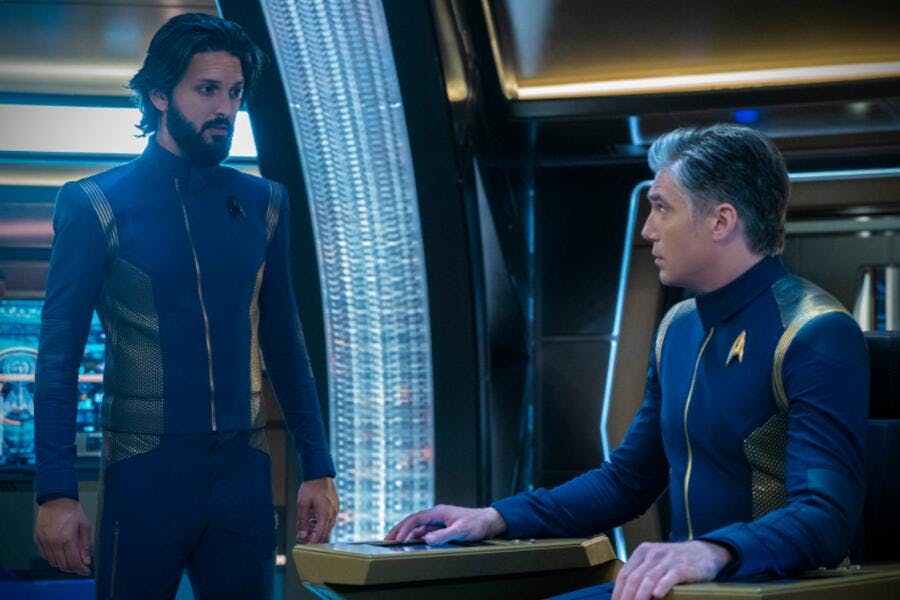
StarTrek.com
Ironically, the gut-wrenching decisions made by Sisko and Pike all received Starfleet Command’s approval. Unfortunately for the captains, this fact did little to assuage their discomfort. Sisko sought solace in Starfleet’s blessing, but he admitted to himself that the responsibility to put his deceptive plan into action fell on his shoulders. Pike’s willingness to snap at Cornwell as Discovery approached Section 31’s headquarters indicated that he fostered some level of resentment toward his superiors for their role in sidelining the Enterprise.
The Repercussions
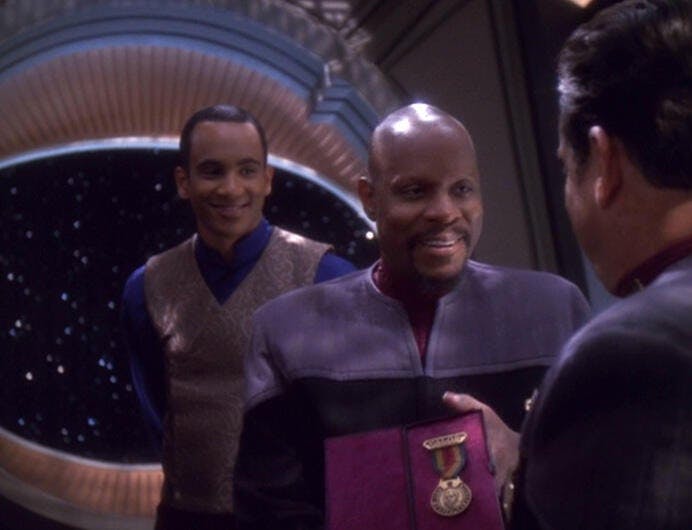
StarTrek.com
Once Sisko completed his personal log, he promptly deleted the entry after declaring that a guilty conscience was a small price to pay for the Alpha Quadrant’s safety. The convoluted scheme succeeded in bringing the Romulans into the war and turning the tide in favor of the Federation Alliance. Sisko never revisited these emotions after “In The Pale Moonlight,” and he received the appropriately-titled Christopher Pike Medal of Valor later that year. It genuinely seemed as if Sisko managed to put the situation behind him the moment he erased his log.
The Federation’s victory over the Klingons rendered the Enterprise’s lack of involvement irrelevant, but Pike’s guilt lingered much longer than Sisko’s self-doubt. Even after achieving a moment of denouement with Tyler in “Light and Shadows,” Pike’s sensitivity about the war immediately resurfaced during his quarrel with Cornwell in the very next episode. However, Cornwell’s assertion that Starfleet Command viewed Pike’s survival as a means to preserve the Federation’s values evidently put the bulk of the captain’s concerns to rest.
The wars with the Dominion and Klingon Empire taxed the Federation’s resolve and placed strains on two of Starfleet’s most celebrated captains. The Dominion’s imposing might prevented Sisko’s thoughts from gnawing at his conscience for an extended period, while Pike’s intense sentiments simmered long after peace with the Klingons had been achieved. Perhaps the key lesson that can be learned from the captains’ parallel treks is that war takes a great toll on its participants and noncombatants alike.
This article was originally published on September 16, 2020.



